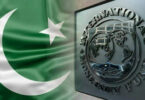F.P. Report
ISLAMABAD: As the State Bank of Pakistan (SBP) was likely to announce the new monetary policy in the next meeting this month, the All Pakistan Business Forum (APBF) has called for a cut in the monetary policy rate to attain the high position in Ease of Doing Business ranking, amidst record high markup rate, hyperinflation and rising energy prices.
In a statement issued on Saturday, the APBF President Syed Maaz Mahmood said that already unprecedented inflation and high markup rate have drastically reduced private sector borrowings during the outgoing fiscal year, besides the country has been far behind in the ease of doing business ranking. So, further hike in discount rate will deteriorate the economic conditions, he added.
He said the SBP has raised its key policy rate by 12.25 percentage points since April 2022, mainly to curb soaring inflation. However, it held rates steady in June saying inflation had peaked at 38pc in the preceding month. It raised rates by 100 bps at an emergency meeting in an effort to secure IMF funds, citing slightly deteriorated inflation outlook.
Maaz Mahmood said that the central bank raised its key interest rate to 22 percent, exceeding investor expectations, as the cash-strapped country attempts to encourage the International Monetary Fund (IMF) to release critical funding. The key rate of the State Bank of Pakistan now stands at 22 percent, its highest level since October 1996. Now, there are reports that the SBP would raise the interest rate by another 1 percent at the upcoming meeting of the Monetary Policy Committee (MPC) to please IMF.
The APBF chief suggested the central bank to adopt an accommodative monetary policy stance, asking the finance minister to fulfill his commitment of reining in inflation besides cutting interest rate and strengthening the undervalued local currency against dollar.
In the last scheduled meeting of December 2023, the SBP maintained the policy rate unchanged at 22 percent citing that the decision took into consideration the impact of the surge in gas prices in November 2023, which exceeded the MPC’s initial projections for inflation.
The MPC acknowledged that this could have repercussions for the inflation outlook, but also noted certain mitigating factors, such as the recent decline in international oil prices and improved availability of agricultural produce. Additionally, it also evaluated that the real interest rate remained positive when assessed on a 12-month forward-looking basis.
Demanding competitive interest rate at regional countries’ level, he said that the SBP’s stance of keeping monetary policy rate at 22 percent was already high compared to the markup rate of China, India and Bangladesh. He said that further monetary tightening and high current account deficit had sparked panic selling across the board, leading to the capital market’s massive tragedy.
Maaz Mahmood said that the government, for its part, should try to cut expenditure and increase revenue through taxes, and has allowed the rupee to depreciate. He stressed the need for reduction in the discount rate, arguing that low key policy rate is essential to make the Pakistani exports sector, as well as the local industry competitive.
He said that in view of achieving exports target and stabilization of the economy we need accommodative monetary policy measures by extending reduction in the policy rates so that the debt liability of the business sector is compensated through lower markup rate.
The APBF President also demanded the immediate reduction in the electricity tariff, especially for the Small and Medium Enterprises as a first step towards a cut in the production cost, while the second and vital step towards this direction would be bringing discount rate to the regional level with a view to provide level-playing field, especially to the export industry.
He said the central bank should announce an initiative related to loans for the Small and Medium Enterprises (SMEs), as the sector has to show collateral to banks, which are always reluctant to offer them concessional credit.







